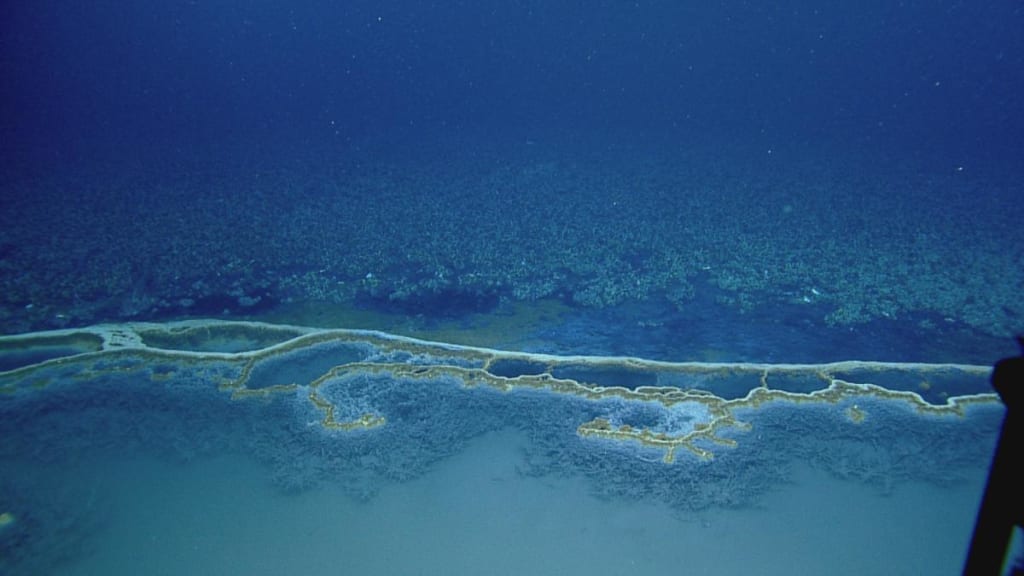
It may seem strange to consider the presence of rivers, lakes, and even waterfalls within our vast oceans. However, these phenomena exist due to changes in water density caused by temperature and salinity levels. Recently, researchers made an intriguing discovery of yet another oceanic lake, this time located at the bottom of the Gulf of Mexico. This particular lake sets itself apart as a significant number of sea creatures that venture into its depths do not return. Situated approximately 3,300 feet below the surface, with a circumference of around a hundred feet and a depth of about twelve feet, it resembles an underwater graveyard, strewn with the remains of sea creatures that ventured in. The lake's warm water temperature is the main allure for these unfortunate creatures. According to a report in the Journal of Oceanography, the water within this lake, also referred to as the "Jacuzzi of Despair," is about five times saltier than the surrounding seawater. Furthermore, the lake exhibits high concentrations of toxic methane and hydrogen sulfide, which prevent it from mixing with the neighbouring waters. The term "Jacuzzi" is attributed to the fact that the water temperature inside the lake reaches 65 degrees Fahrenheit, resembling a hot tub when compared to its surroundings. This deadly lake likely formed when seawater seeped into cracks in the seabed, mixing with the region's subsurface salt formations. Methane gas then bubbled up, carrying the lethal water along with it.
Now let's delve into the enigmatic realm of dark matter. Dark matter, although never directly observed, is estimated to constitute approximately 27% of the universe. Researchers infer its existence based on the gravitational effects it exerts on visible matter. However, a new paper by Professor Eric Valenti from the University of Amsterdam challenges the notion of dark matter's existence, along with gravity itself. Professor Valenti proposes that gravity is not a fundamental force of nature but rather an emergent phenomenon. He suggests an urgent need to reevaluate our current understanding of space, time, and gravity, as it is known that Einstein's theory of gravity does not align with quantum mechanics on large scales. It appears that gravity behaves differently from what Einstein's theory predicts.
Moving on, a mysterious sound emanates from the ocean floor, baffling all attempts to identify its source. In northern Canada, a persistent pinging sound echoes throughout the region during the summer months. The origin of this sound remains a perplexing enigma, with various explanations ranging from mining activities and submarines to environmental activists using the sound to repel wildlife, making it easier to hunt. The Canadian military acknowledges the noise and has initiated investigations. Internal correspondence within the Department of National Defense, obtained by CBC News, suggests that submarines were not immediately ruled out as a potential cause but were not considered the most likely explanation. Perhaps it is not submarines after all; maybe it is Santa's workshop preparing for Christmas.
Lastly, let's explore a topic many students can relate to exams, memorization, and stress. Wouldn't it be wonderful if people could recognize your genius without subjecting you to solving math problems? Interestingly, some scientists share this sentiment. Researchers from King's College London have utilized a novel genetic scoring technique to predict academic achievement solely based on an individual's DNA. This research builds upon a recent genome-wide association study that examined nearly 10 million single nucleotide polymorphisms, the most common type of genetic variation among individuals. Through this analysis, they identified 74 genetic variants significantly associated with the number of years of completed education. The findings indicate that differences in educational achievement are strongly influenced by DNA variations. On average, individuals with higher polygenic scores would achieve grades ranging between A and B, whereas those with lower scores obtained grades one step lower. However, it is important to note that this analysis does not account for the role of effort, as we know that talent alone does not guarantee success. In summary, we have covered topics ranging from a perilous lake in the ocean to the potential illusion of gravity, an unidentified sound unsettling northern Canada, and the possibility of DNA testing replacing standardized exams in future.
About the Creator
Enjoyed the story? Support the Creator.
Subscribe for free to receive all their stories in your feed. You could also pledge your support or give them a one-off tip, letting them know you appreciate their work.





Comments
There are no comments for this story
Be the first to respond and start the conversation.